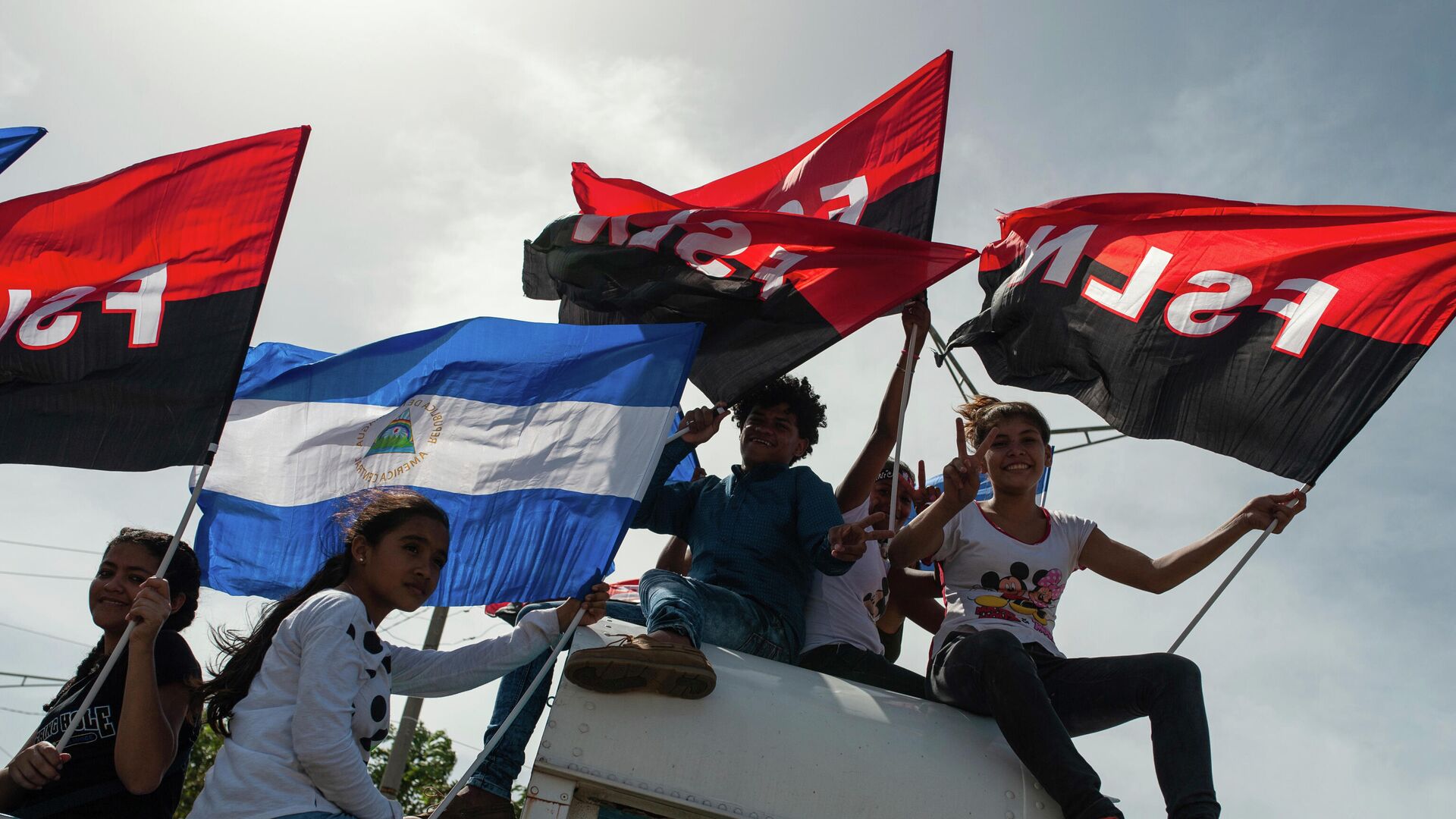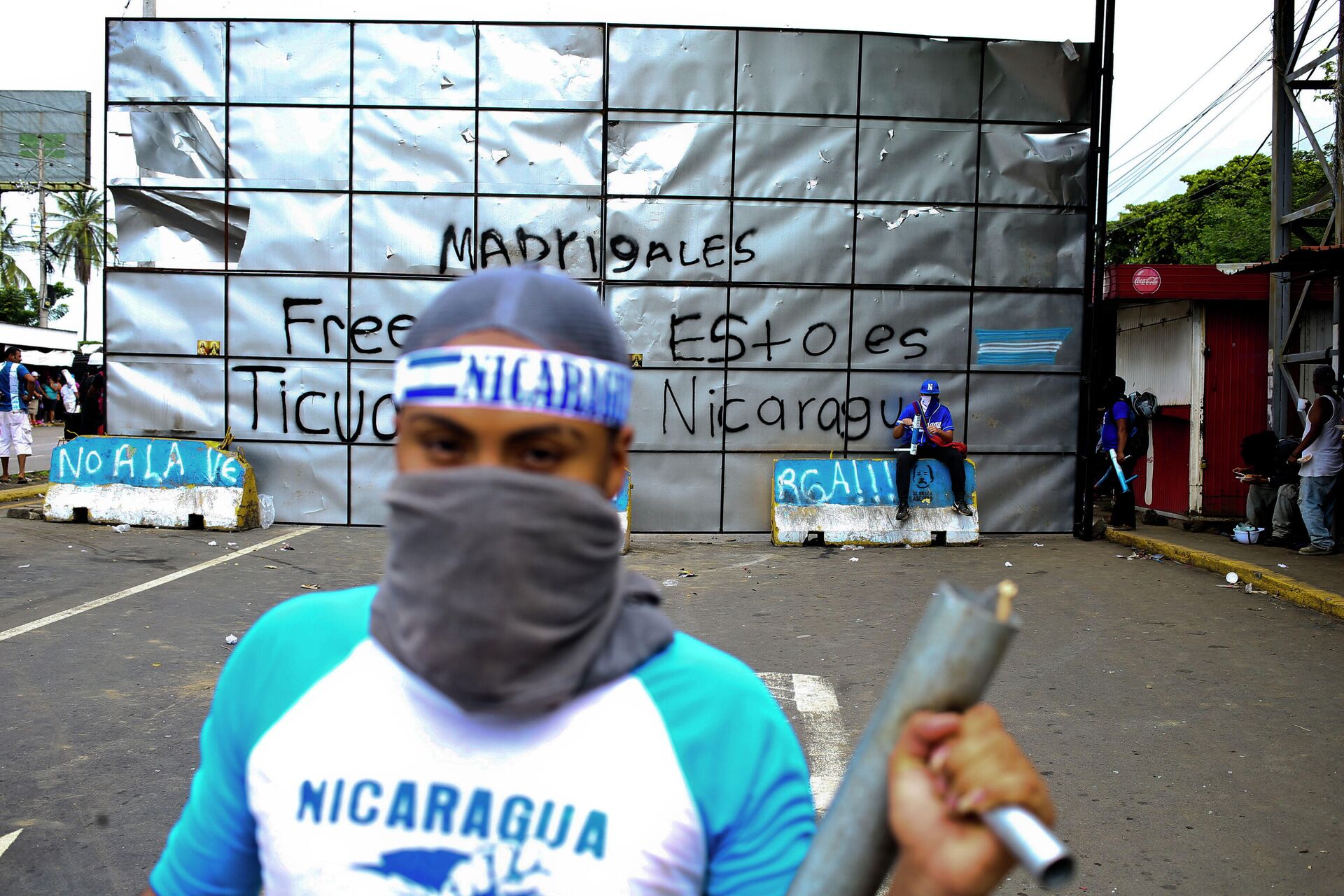US Congress Passes RENACER Act to Sanction Nicaragua Ahead of Elections Sandinistas Expected to Win
01:15 GMT 04.11.2021 (Updated: 19:51 GMT 31.10.2022)

© AP Photo / Cristobal Venegas
Subscribe
The US House of Representatives passed by a wide margin on Wednesday a bill intended to hit Nicaragua with crippling sanctions like those already in place against Venezuela, another country where the US is pushing regime change through coercive measures.
The Reinforcing Nicaragua’s Adherence to Conditions for Electoral Reform (RENACER) Act passed by a vote of 387-35. It was previously passed by the Senate and now heads to the White House, where US President Joe Biden is likely to sign it before the Nicaraguan elections on Sunday.
Once signed into law, RENACER will impose sanctions on members of Nicaraguan President Daniel Ortega's administration, including police and military officials, as well as Ortega’s family. Other targets include officials at Nicaragua’s central bank, members of the Supreme Electoral Council, members of the ruling Sandinista National Liberation Front (FSLN), and their family members, as well.
The structure is not unlike those sanctions imposed on Venezuela in the wake of former US President Barack Obama’s 2015 labeling of the South American nation as an “unusual and extraordinary threat to the national security and foreign policy of the United States.” While appearing limited in form, their impact was extensive, as investment or even trade with Venezuela became a risky maneuver, and overcompliance in enforcing the sanctions reigned.
In April 2019, the Center for Economic and Policy Research (CEPR) think tank reported that two years of sanctions had caused 40,000 excess deaths in Venezuela and warned that hundreds of thousands of vulnerable people with diseases requiring regular treatment, such as HIV, diabetes, cancer, and hypertension, lacked access to necessary medication as a result.
‘Making the Economy Scream’
Code Pink, a US-based antiwar group, urged its supporters ahead of the vote to pressure their representatives to oppose the RENACER Act, calling it “a blueprint for regime change in Nicaragua by making the economy scream. If passed, it would give future administrations the legal framework for imposing broad sectoral sanctions and the justification for more coup attempts.”
RENACER also asks Biden to reconsider Nicaragua’s membership in the CAFTA-DR regional trade agreement, which lowered trade barriers to Nicaragua’s exporting to the United States.
The 1990s-era deal dates to the period after US-backed Contra guerrillas forced the Sandinistas out of office in 1990 but before Ortega’s return to power in 2006 elections. It created free trade zones in which up to one-sixth of Nicaragua’s formal sector workforce is employed by local contractors who sell their manufactured goods to US corporate buyers like Wal-Mart, VF Jeans, Levi Strauss, Tommy Hilfiger, Nike and the Gap.
Roughly 60% of Nicaragua’s exports go to the United States, most of which are apparel, rolled tobacco, and produce such as raw sugar and coffee, according to data collected by the OEC. Removing the Central American nation from CAFTA could deal a devastating blow to its economy and the social programs the FSLN government has put in place to help its poorest citizens.
Rep. Maria Salazar (R-FL), who introduced RENACER into the House, said Wednesday after the passing vote that what she was most proud of was introducing the free trade agreement reconsideration into the bill.
Today the #RENACER Act passed in the United States Congress to reprimand Daniel Ortega for his sins. Let this be a warning to aspiring dictators — con los Estados Unidos, no se juega. 🇺🇸 #SOSNicaragua 🇳🇮 pic.twitter.com/qfLlj2oOXc
— María Elvira Salazar 🇺🇸 (@MaElviraSalazar) November 3, 2021
“The message now for Daniel Ortega is that making a commercial treaty or having a commercial exchange with the United States is not a right, it is a privilege that you will no longer have,” she said.
“Nicaraguans have people who are defending them. That is why today is a glorious day for the Nicaraguan people, the Nicaraguan people who want freedom, democracy and progress in their country and that a little dictator like Ortega and Murillo does not come to steal the country that belongs to everyone, to all Nicaraguans,” Salazar added, referring to Nicaraguan Vice President Rosario Murillo, who is also Ortega’s wife.
Figures Behind 2018 Riots Arrested Before Election
In April 2018, US-backed protests erupted in Nicaragua driven by anger over reforms to the nation’s pension plan. While the proposed changes were quickly revoked, the demonstrations quickly grew into an uprising as armed gangs joined the opposition, set up roadblocks, and targeted police and FSLN members. They were heavily supported by the US Agency for International Development (USAID), a US State Department agency, and the National Endowment for Democracy (NED), a CIA front group.
Several hundred people were killed during the riots, which lasted into the summer, but as Nicaraguan academics demonstrated, the numbers given to foreign press were inflated by a variety of measures, giving a false impression that Ortega’s government has massacred its way through the protests. In fact, more were killed by the opposition, and most of the deaths attributed to government repression had no connection to the protests at all.
While many of the movement’s leading figures went into hiding for a time, they later re-emerged and formed a new opposition movement, and several attempted to run for election in the elections scheduled for Sunday.

In this June 6, 2018 photo, an anti-government protester poses for a picture holding a homemade mortar at a roadblock set up by protesters in Ticuantepe, Nicaragua. How Nicaragua emerges from its political crisis will likely depend on the willingness of anti-government students to continue confronting President Daniel Ortega's government.
© AP Photo / Esteban Felix
More than two dozen have been arrested, including Lesther Alemán, a former student leader; Juan Sebastian Chamorro, a US-trained economist and head of the FUNIDES think tank who heads the group Civic Alliance for Justice in Democracy, which united with other opposition groups, including Alemán’s, last year to “reinvigorate the fight" and “rebuild the country;” and Cristiana Chamorro Barrios, whose Violeta Barrios de Chamorro Foundation for Reconciliation and Democracy has long served as a third-party “pass-through” for CIA money to cultivate an anti-Sandinista opposition movement in Nicaragua.
Demonization Campaign
Since the 2018 riots, which took place amid a widespread anti-leftist US offensive in Latin America that engulfed Cuba, Venezuela, Bolivia, and El Salvador, Washington has ramped up its demonization of Nicaragua, the FSLN, and Ortega, casting the country as sliding toward dictatorship and becoming puppets of Caracas and Moscow.
As MintPress News has demonstrated, Western-friendly NGOs have produced reports claiming the country’s indigenous population is under attack by Ortega instead of the self-rule they enjoy; that deforestation is increasing instead of decreasing; and that Ortega’s government is as kleptocratic as the US-backed Somoza family who ruled Nicaragua before the FSLN overthrew them in 1979.
A senior Biden administration official told Politico last week that the arrests were a “very grave and very disturbing” development that “fundamentally alters” how the FSLN government should be seen.
“Before it was a hybrid type of regime where there were elements of democracy,” such as opposition candidates being allowed to run for the presidency, the official said. “But what you’re essentially getting there is something that no longer really has the characteristics of anything really resembling a democracy.”
In fact, the ballots on Sunday will have six candidates for president. In addition to the FSLN, whose candidate is Ortega, there is a right-wing evangelical party, and several varieties of liberal parties.
However, with recent opinion surveys showing roughly 70% support for the FSLN, it seems likely the democratic socialist group will prevail. In Washington, an FSLN victory has already been defined as a sham.
